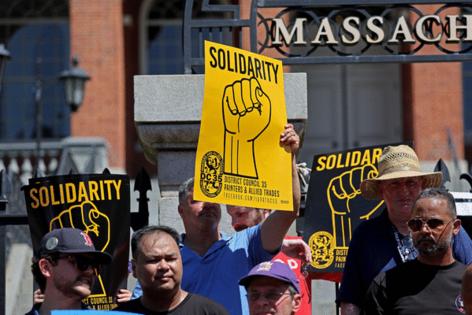Driverless cars meet union resistance as Massachusetts Legislature considers new rules
Published in News & Features
BOSTON — Citing “serious safety, workforce, and ethical concerns,” a group of union members urged lawmakers to pump the brakes on plans to open the Bay State’s roads to driverless cars.
Proposed legislation before the Joint Committee on Transportation that would establish rules for autonomous vehicles in Massachusetts was met with an earful from members of a half dozen local unions, who warned they could lose their livelihoods if cars are allowed to start driving themselves.
Representatives from the 32BJ SEIU, IAMAW District 15, the App Drivers Union, Teamsters Local 25, UFCW Local 1445 and the Greater Boston Labor Council rallied at the State House ahead of the hearing and joined lawmakers to express their concerns over the bills.
Massachusetts AFL-CIO’s President Chrissy Lynch warned that people’s jobs are in the hands of the Legislature.
“The presence of autonomous vehicles in Massachusetts raises serious safety, workforce, and ethical concerns. AV companies like Google-owned Waymo could displace thousands of workers in Massachusetts,” she warned.
“That means thousands of people here in Massachusetts could lose their jobs, face a severe degradation of their wages or bargaining power, or otherwise have their job functions fundamentally altered by self-driving vehicle technology,” she told lawmakers.
Lynch urged lawmakers to set a high bar for driverless car companies on matters of safety, worker training, transition policies, “and assurances that transportation services will meet a basic public standard.”
The companies in question, Lynch said, claim that their driverless cars are safer, but their “track record” demonstrates otherwise. Their efforts to “remove barriers to deployment” of the new technology is at odds with widely reported accidents, she said.
The unions aren’t against new technology, she said, noting “we have seen time and time again, that when workers and communities are an afterthought, when they are left out of the decision-making process, that the results for them are bad.”
Matthew Walsh, state policy manager for Waymo, told the committee that half of U.S. states have already enacted laws similar to those under consideration by the Legislature.
“Without this regulatory framework in place, Massachusetts will continue to lose out on the life-saving and economic benefits autonomous vehicles are already providing across the country,” he said.
Waymo is on a mission, he said, to be the world’s most trusted driver. In pursuit of that, the company has begun offering a “fully autonomous ride hailing service” to residents of Phoenix, San Francisco, Los Angeles, and Austin.
“As of this morning, Atlanta joined that list as well,” he said.
The company completes a quarter of a million trips in those cities weekly, he said, and in that time the automated driving system drives more than 1 million miles.
The data shows, he said, that the “frequency and severity of collisions” is reduced in cities where Waymo operates. Boston is currently a testing ground for their vehicles, he said, which have been driven manually through the city for the last several weeks.
_____
©2025 MediaNews Group, Inc. Visit at bostonherald.com. Distributed by Tribune Content Agency, LLC.







Comments